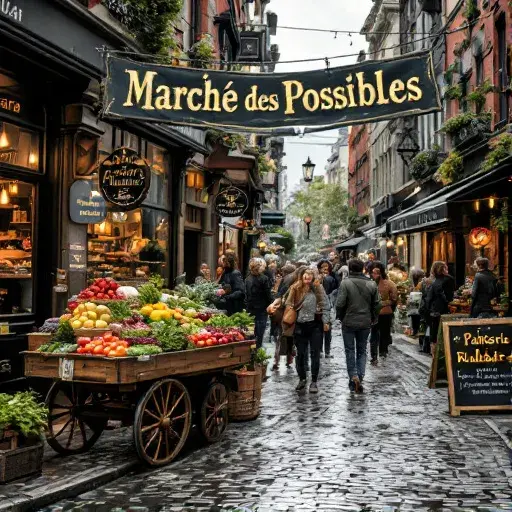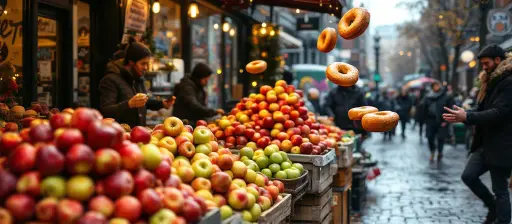Savoring Montreal: A Culinary Journey Through Quebec's Cultural Hub

Montreal stands as a vibrant mosaic of European charm and North American energy, where cobblestone streets of Old Montreal contrast with the sleek skyscrapers of downtown. As Canada's second-largest city and the cultural heart of Quebec, Montreal boasts a unique French-Canadian identity that permeates its architecture, language, and most deliciously, its food. Founded in 1642 as a missionary colony, the city has evolved into a cosmopolitan destination where history and modernity coexist in perfect harmony. What truly sets Montreal apart is its extraordinary culinary landscape—a reflection of its multicultural heritage and innovative spirit that has earned it recognition as one of North America's most exciting food cities.

Savoring Montreal: A Culinary Journey Through Quebec's Cultural Hub
Introduction
Montreal stands as a vibrant mosaic of European charm and North American energy, where cobblestone streets of Old Montreal contrast with the sleek skyscrapers of downtown. As Canada's second-largest city and the cultural heart of Quebec, Montreal boasts a unique French-Canadian identity that permeates its architecture, language, and most deliciously, its food. Founded in 1642 as a missionary colony, the city has evolved into a cosmopolitan destination where history and modernity coexist in perfect harmony. What truly sets Montreal apart is its extraordinary culinary landscape—a reflection of its multicultural heritage and innovative spirit that has earned it recognition as one of North America's most exciting food cities.
Overview of the Food Scene
Montreal's food scene is a delightful contradiction—deeply rooted in tradition yet constantly evolving. The city's culinary identity is anchored in its French heritage, evident in the abundance of patisseries, bistros, and fine dining establishments that dot the urban landscape. However, Montreal cuisine extends far beyond French influences, incorporating Jewish, Italian, Portuguese, and more recently, influences from across Asia, the Middle East, and Latin America.
The city is famous for several iconic dishes that have achieved cult status. Montreal-style bagels—smaller, sweeter, and denser than their New York counterparts—are hand-rolled, boiled in honey-sweetened water, and baked in wood-fired ovens. Smoked meat sandwiches, particularly from establishments like Schwartz's Deli, feature spiced brisket cured for over a week, smoked, and steamed to perfection. And then there's poutine—a quintessentially Quebecois creation of french fries topped with cheese curds and smothered in gravy, now reimagined in countless creative variations across the city.
The restaurant scene in Montreal ranges from historic establishments that have served the same beloved recipes for generations to cutting-edge eateries pushing culinary boundaries. Markets like Jean-Talon and Atwater showcase Quebec's agricultural bounty, while food halls and street food festivals highlight the city's contemporary food culture. Montreal also boasts a thriving café culture, craft brewery scene, and cocktail bars that have helped cement its reputation as a city that takes its food and drink very seriously.
Where to Eat
Classic Montreal Essentials
Begin your culinary exploration with Montreal's most iconic offerings. Schwartz's Deli has been serving its famous smoked meat sandwiches since 1928—the lines may be long, but the tender, spiced brisket piled high on rye bread with mustard is worth the wait. For the quintessential Montreal bagel experience, head to St-Viateur Bagel or Fairmount Bagel, where bagels are still made the traditional way, 24 hours a day. These hand-rolled, honey-boiled treasures are best enjoyed fresh from the oven, perhaps with a schmear of cream cheese and lox.
Market-Fresh Discoveries
Montreal's markets offer both a feast for the senses and opportunities to sample local specialties. Jean-Talon Market in Little Italy is the city's largest, bustling with farmers, artisanal food producers, and specialty shops. Stop by La Boîte aux Huîtres for fresh oysters, sample Quebec cheeses at Qui Lait Cru, or enjoy a flaky pastry at Première Moisson. In the southwest, Atwater Market offers a similar experience in a beautiful Art Deco building, with excellent butchers, chocolatiers, and the renowned Satay Brothers serving Singaporean street food.
Contemporary Quebec Cuisine
For dinner, explore restaurants that showcase modern Quebec cuisine. Joe Beef in Little Burgundy has earned international acclaim for its indulgent, creative approach to French-Canadian fare—reservations are essential. Nearby, Liverpool House offers a slightly more casual but equally delicious experience from the same restaurant group. In Mile End, Lawrence serves sophisticated farm-to-table cuisine with British influences, while Au Pied de Cochon offers Martin Picard's famously rich interpretations of Quebec classics, including foie gras poutine and duck in a can.
International Flavors and Hidden Gems
Montreal's cultural diversity shines through its neighborhood eateries. In Mile-Ex, Dinette Triple Crown serves authentic Southern comfort food that you can take to picnic in the nearby park (they'll even provide a basket). The Plateau offers Patati Patata, a tiny diner serving excellent, affordable poutine and burgers. For outstanding Portuguese chicken, visit Ma Poule Mouillée or Romados. Little Italy boasts Pizzeria Napoletana, serving authentic pies since 1948, while Chinatown's Nouilles de Lan Zhou offers hand-pulled noodles that rival any in Asia.
What to Do
Explore Historic Old Montreal
Begin with the historic heart of the city. Old Montreal (Vieux-Montréal) features cobblestone streets and buildings dating back to the 17th century. Visit the magnificent Notre-Dame Basilica, where light and sound show "AURA" transforms the interior into an immersive experience. Stroll along Place Jacques-Cartier and the Old Port, where you can rent bikes, take a river cruise, or simply enjoy the waterfront promenade. The Pointe-à-Callière Museum offers fascinating insights into Montreal's archaeological and historical foundations.
Discover Montreal's Diverse Neighborhoods
Each Montreal neighborhood offers a distinct character worth exploring. The Plateau Mont-Royal charms with colorful spiral staircases, murals, and trendy boutiques along Avenue Mont-Royal and Boulevard Saint-Laurent. Mile End is a hipster haven with independent bookstores, vintage shops, and cafés like Café Olimpico where locals gather for exceptional coffee. Don't miss Drawn & Quarterly bookstore or the vintage shops along Bernard Street. In summer, check the schedule for Jardins Gamelin, which hosts free cultural events between May and September.
Embrace Nature in the Heart of the City
For outdoor enthusiasts, Mount Royal Park offers an urban oasis designed by Frederick Law Olmsted (who also designed New York's Central Park). Hike to the summit for panoramic city views, rent a rowboat on Beaver Lake, or join the Sunday "Tam-Tams," an informal drum circle at the George-Étienne Cartier Monument. The Montreal Botanical Garden showcases 22,000 plant species, including spectacular Chinese and Japanese gardens, while the adjacent Biodome recreates four ecosystems of the Americas, complete with their wildlife.
Immerse Yourself in Arts and Culture
Montreal's vibrant arts scene offers something for every interest. The Montreal Museum of Fine Arts houses an impressive collection spanning centuries and continents, with frequent world-class exhibitions. Contemporary art enthusiasts should visit DHC/ART Foundation and Musée d'art contemporain. The city's festival calendar is packed year-round, with highlights including the Montreal International Jazz Festival, Just For Laughs comedy festival, and Osheaga music festival. For a uniquely Montreal experience, catch a performance by Cirque du Soleil, which was founded in the city.
Underground City and Architectural Wonders
When weather doesn't cooperate, explore RÉSO (the Underground City), a vast network of tunnels connecting shopping centers, metro stations, and buildings across downtown. This climate-controlled environment houses over 1,700 shops and restaurants. Architecture buffs should visit Habitat 67, Moshe Safdie's revolutionary modular housing complex built for Expo 67, and the Olympic Stadium with its inclined tower—the tallest in the world—offering spectacular views from its observation deck.
Where to Stay
Old Montreal and Downtown
For first-time visitors, Old Montreal offers the perfect blend of historic charm and convenient access to major attractions. The cobblestone streets, historic buildings, and proximity to the waterfront create a European atmosphere that's particularly magical in the evening. Boutique hotels housed in restored heritage buildings provide character and comfort, though they tend to command premium prices. Alternatively, downtown Montreal offers more modern accommodations with easy access to shopping, dining, and the Underground City. This area is well-connected by public transit and within walking distance of many attractions, making it ideal for travelers who want to maximize their exploration time.
The Plateau and Mile End
For a more local experience, consider staying in the Plateau Mont-Royal or Mile End neighborhoods. These vibrant areas offer a glimpse into everyday Montreal life, with tree-lined streets, distinctive architecture featuring external spiral staircases, and countless cafés, restaurants, and independent shops. Accommodations here tend toward boutique hotels, bed and breakfasts, and apartment rentals that provide more space and the option to self-cater. While slightly removed from the main tourist areas, these neighborhoods offer excellent access to Mount Royal Park and are well-served by public transportation, including the convenient BIXI bike-sharing system that lets you explore the city like a local.
Conclusion
Montreal offers a rare combination of European charm, North American energy, and a food scene that rivals global culinary capitals. From the simple pleasure of a fresh bagel to the sophisticated creations of award-winning chefs, the city invites visitors to explore with their taste buds as much as with their eyes. Beyond its gastronomic delights, Montreal's rich history, vibrant neighborhoods, and cultural treasures provide endless opportunities for discovery. Whether you're wandering the historic streets of Old Montreal, picnicking in Mount Royal Park, or gallery-hopping in Mile End, the city's distinctive character and joie de vivre are infectious. As Montrealers themselves might say, their city isn't just a place to visit—it's a place to savor.